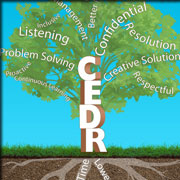About CEDR
CEDR (DoDEA’s Center for Early Dispute Resolution) is a neutral, confidential resource that assists DoDEA and its employees in addressing and managing conflicts and disputes constructively. See Regulation 1800.01 (Alternative Dispute Resolution).
More traditional, adversarial ways of addressing differences involve a decision maker (e.g., a supervisor, arbitrator, or judge) in deciding who wins and who loses. In contrast, CEDR’s processes allow parties to develop their own solutions. They also generally allow participants to reach resolutions more quickly and cause less damage to the parties’ relationships.
CEDR provides processes that are voluntary, that allow the parties to control the outcome, and that help parties to manage the current and future conflicts more effectively and constructively.
CEDR doesn’t make decisions for anyone; it helps people make decisions for themselves.
CEDR provides a way to address problems within DoDEA that aren’t covered by any available legal remedies (grievances, EEO charges, etc.). At the same time, working with CEDR does not prevent anyone from using their legal remedies (provided that the individual acts within the applicable time limits); it just provides an additional option.
CEDR’s values and principles:
Confidentiality
CEDR personnel will not discuss your situation, your concerns, or information you have provided to CEDR with anyone outside CEDR without your permission. We will not give out information that identifies you or indicates that you have communicated with CEDR. We will only disclose information if its personnel believe that disclosure is required by law (such as if there is a risk of serious harm or abuse) or if it is ordered to make disclosure by a court. CEDR will resist participating in formal procedures, such as testifying in a proceeding.
Speaking to CEDR will not be considered “legal” notice to DoDEA. Speaking to or working with CEDR will supplement rather than replace any legal rights you have. If you have time limits within which you must exercise your legal rights, those time limits will normally remain in place.
Neutrality and Impartiality
CEDR has no personal stake in the outcome of any issue brought to it. We believe in fairness and treat all parties as equal.
Informality
CEDR only provides informal, non-adversarial processes. It does not provide any formal procedures, such as an adjudicative or grievance processes, although you may explore informal processes with CEDR and still keep your legal rights (subject to any applicable time limits).
